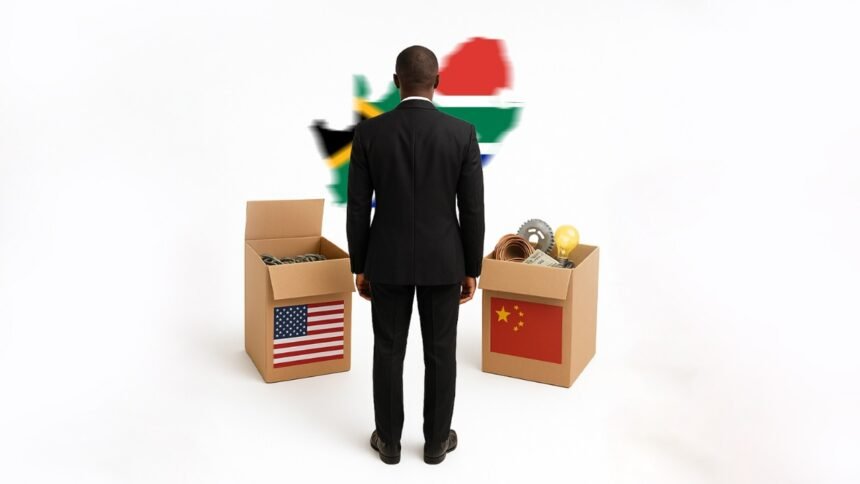South Africa has just been handed a new economic headache – and an opportunity. The United States’ decision to slap steep tariffs on South African goods has pushed Pretoria to look east, not just for sympathy but for money, investment, and markets. It is a story that reads like a Cold War remix with modern characters: Washington flexes trade power, Beijing swoops in to offer a hand, and a key African economy tries to turn crisis into leverage.
President Cyril Ramaphosa didn’t mince words this week. Standing before reporters, he accused major powers of “using trade as a weapon” and warned that punitive tariffs threaten jobs, growth, and political stability. His government is scrambling to open talks with Washington to reverse the move, but in the meantime, Chinese delegations are reportedly in Johannesburg discussing new investments in mining, renewable energy, and infrastructure. In diplomatic terms, Pretoria is hedging – signaling to the Americans that if they shut a door, someone else will open a window.
The U.S. tariffs, announced earlier this month, targeted South African metals, automotive components, and agricultural products, citing unfair subsidies and what Washington calls “unbalanced market practices.” South African exporters cried foul, saying the decision came with little consultation and threatens thousands of jobs. For Pretoria, the tariffs could not have come at a worse time. Growth is already sluggish, unemployment hovers above 30%, and load-shedding – the infamous rolling blackouts – continues to haunt households and industry.
Enter China, stage left. Beijing has been steadily deepening its economic footprint in Africa for two decades, but moments like this offer an opening to push deeper. Early reports suggest China is proposing multi-billion-dollar investments in critical minerals, particularly rare earths and platinum group metals, where South Africa is a global heavyweight. Such deals would give Beijing an even firmer grip on global supply chains for green technologies, from electric vehicle batteries to solar panels.
The optics are hard to miss: Washington punishes, Beijing partners. That framing may be overly dramatic – Chinese loans and investments often come with strings attached – but it resonates politically in South Africa, where anti-Western sentiment has been rising in some quarters of the ruling African National Congress. Pretoria has long prided itself on being “non-aligned,” but recent years have seen it tilt closer to the BRICS bloc, hosting high-profile summits and joining calls for a rebalanced global financial order.
What makes this moment particularly combustible is timing. South Africa is heading toward elections next year, and Ramaphosa is under pressure to deliver tangible wins for the electorate. Announcing big-ticket Chinese investments could allow him to claim he is protecting jobs and attracting new growth. It could also play well with younger, left-leaning voters who see China as a partner rather than a threat. The risk, of course, is that cozying up to Beijing might further strain relations with Washington at a time when the U.S. remains an important trading partner and source of technology and capital.
Geopolitical analysts see the drama as part of a bigger picture: the reordering of global trade alliances in an era of strategic competition. If South Africa successfully pivots to China without losing too much ground with the U.S., it could set a template for other African nations who are tired of feeling like pawns in great-power games. But if the pivot backfires – for example, if Chinese projects stall or saddle Pretoria with debt – the move could turn into a political liability.
For now, Pretoria seems eager to play both sides: pressing Washington for tariff relief while rolling out the red carpet for Beijing. It is a delicate dance, and one that reflects Africa’s growing confidence in navigating global power politics. South Africa may not be able to dictate terms to Washington or Beijing, but it can remind both that it has choices. And in an era where every port, mine, and factory counts in the global race for resources, that choice matters.
If Ramaphosa can turn tariff pain into investment gain, he might just turn an economic slap into a diplomatic win. But if he fails, voters will not care about geopolitics – they will care about prices, jobs, and power cuts. And that, in the end, is the real battlefield where this drama will play out.










